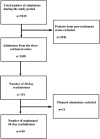Readmission rates and predictors of avoidable readmissions in older adults in a tertiary care centre
- PMID: 36505554
- PMCID: PMC9730993
- DOI: 10.4103/jfmpc.jfmpc_1957_21
Readmission rates and predictors of avoidable readmissions in older adults in a tertiary care centre
Abstract
Context: Thirty-day readmissions are used to gauge health care accountability, which occurs as part of the natural course of the illness or due to avoidable fallacies during the index admission. The utility of this metric is unknown in older adults from developing countries.
Aim: To ascertain the unplanned 30-day readmission rate and enumerate predictors of avoidable hospital readmission among early (0-7 days) and late (8-30 days) readmissions.
Settings and design: A retrospective chart audit of 140 older adults who were readmitted to a premier tertiary care teaching hospital under Geriatrics from the neighboring states of Tamil Nadu, Andhra Pradesh, and Kerala were undertaken.
Methods and materials: Data from health records were collected from the hospital electronic database from May 2015 to May 2020. The data was reviewed to determine the 30-day readmission rate and to ascertain the predictors of avoidable readmissions among both early and late readmissions.
Results: Out of 2698 older adults admitted to the geriatric wards from the catchment areas, the calculated 30-day hospital readmission rate was 5.18%, and 41.4% of these readmissions were potentially avoidable. The median duration from discharge to the first readmission was ten days (Interquartile range: 5-18 days). Patients had to spend INR 44,000 (approximately 602 USD) towards avoidable readmission. The most common causes for readmission included an exacerbation, reactivation, or progression of a previously existing disease (55.7%), followed by the emergence of a new disease unrelated to index admission (43.2%). Fifty-eight patients (41.4%) were readmitted within seven days following discharge. Early readmissions were seen in patients with malignancies [8 (13.5%) vs. 4 (4.8%); P = 0.017], on insulin (P = 0.04) or on antidepressants (P = 0.01). Advanced age was found to be an independent predictor of avoidable early readmission (OR 2.99 95%CI 1.34-6.62, P = 0.007), and admission to a general ward (as compared to those admitted in a private ward) was an independent predictor of early readmissions (OR 2.99 95%CI 1.34-6.62, P = 0.007).
Conclusion: The 30-day readmission rate in a geriatric unit in a tertiary care hospital was 5.2%. Advanced age was considered to be an independent predictor of avoidable early readmission. Future prospective research on avoidable readmissions should be undertaken to delineate factors affecting 30-day avoidable hospital readmissions in developing nations.
Keywords: Avoidability; elderly; geriatrics; older adults; preventability; readmission.
Copyright: © 2022 Journal of Family Medicine and Primary Care.
Conflict of interest statement
There are no conflicts of interest.
Similar articles
-
Thirty-day readmission rate as a surrogate marker for quality of care in neurosurgical patients: a single-center Canadian experience.J Neurosurg. 2018 Jul 6;130(5):1692-1698. doi: 10.3171/2018.2.JNS172962. Print 2019 May 1. J Neurosurg. 2018. PMID: 29979117
-
Incidence of Avoidable 30-Day Readmissions Following Hospitalization for Community-Acquired Pneumonia in France.JAMA Netw Open. 2022 Apr 1;5(4):e226574. doi: 10.1001/jamanetworkopen.2022.6574. JAMA Netw Open. 2022. PMID: 35394509 Free PMC article.
-
Incidence of potentially avoidable urgent readmissions and their relation to all-cause urgent readmissions.CMAJ. 2011 Oct 4;183(14):E1067-72. doi: 10.1503/cmaj.110400. Epub 2011 Aug 22. CMAJ. 2011. PMID: 21859870 Free PMC article.
-
Measuring and preventing potentially avoidable hospital readmissions: a review of the literature.Hong Kong Med J. 2010 Oct;16(5):383-9. Hong Kong Med J. 2010. PMID: 20890004 Review.
-
Independent Predictors of 30-Day Readmission to Acute Psychiatric Wards in Patients With Mental Disorders: A Systematic Review and Meta-Analysis.Cureus. 2023 Jul 26;15(7):e42490. doi: 10.7759/cureus.42490. eCollection 2023 Jul. Cureus. 2023. PMID: 37637588 Free PMC article. Review.
Cited by
-
Patient- and family-centred care transition interventions for adults: a systematic review and meta-analysis of RCTs.Int J Qual Health Care. 2023 Dec 26;35(4):mzad102. doi: 10.1093/intqhc/mzad102. Int J Qual Health Care. 2023. PMID: 38147502 Free PMC article.
References
-
- Allaudeen N, Vidyarthi A, Maselli J, Auerbach A. Redefining readmission risk factors for general medicine patients. J Hosp Med. 2011;6:54–60. - PubMed
LinkOut - more resources
Full Text Sources

